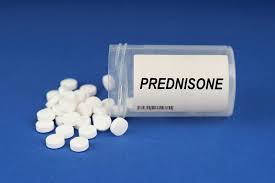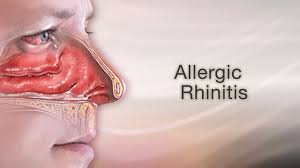
What is Prednisone?
Prednisone is a synthetic corticosteroid, a powerful anti-inflammatory drug that mimics the action of natural hormones produced by the adrenal glands. These hormones help the body regulate inflammation, immune responses, and reactions to stress. Prednisone is often prescribed for a range of conditions associated with excessive immune system activity, including allergies, asthma, autoimmune diseases, and inflammatory processes.
One of the common conditions for which prednisone may be prescribed is allergic rhinitis.
What is Allergic Rhinitis?
Allergic rhinitis is the inflammation of the nasal mucosa caused by the immune system’s reaction to allergens. The most common allergens include pollen (especially during spring and fall), dust mites, pet dander, mold, and other airborne substances. Allergic rhinitis can be seasonal (commonly known as hay fever) or perennial, depending on environmental factors.
Symptoms of allergic rhinitis:
- Sneezing
- Nasal congestion
- Runny nose
- Itchy nose and eyes
- Watery eyes
- Headache or sinus pressure
While many people manage their symptoms with antihistamines or nasal corticosteroid sprays, severe cases may require stronger treatment, such as prednisone.
How Prednisone Works for Allergic Rhinitis
Prednisone helps in several ways when treating allergic rhinitis:
- Anti-inflammatory effect
One of prednisone’s primary mechanisms is its ability to suppress inflammatory processes in the body. In allergic rhinitis, the immune system reacts to allergens as though they were a threat, causing inflammation in the nasal mucosa. This inflammation leads to swelling, increased mucus production, and difficulty breathing. Prednisone suppresses the production of inflammatory substances (such as cytokines), helping to reduce these symptoms and decrease inflammation. - Suppression of immune response
During an allergic reaction, the immune system becomes hyperactive in response to normally harmless substances (allergens). Prednisone dampens the activity of white blood cells and other immune components that trigger this overreaction. This reduces allergic symptoms such as itching, sneezing, and nasal discharge. - Reduction of histamine production
Histamine is a chemical released by the body during contact with allergens and is responsible for most allergic symptoms, such as itching, redness, and swelling of mucous membranes. Prednisone slows down histamine release, significantly reducing allergic rhinitis symptoms. - Decreasing swelling and nasal congestion
Inflammation and swelling of the nasal mucosa cause congestion and difficulty breathing. Thanks to its anti-inflammatory properties, prednisone helps reduce swelling and restore normal breathing.
When is Prednisone Prescribed for Allergic Rhinitis?

Prednisone is typically prescribed in cases where other treatments, such as antihistamines or nasal corticosteroid sprays, are ineffective or insufficient to control symptoms. This might be necessary in:
- Severe or prolonged cases of allergic rhinitis, accompanied by significant swelling and inflammation.
- Chronic allergic rhinitis that severely impacts the patient’s quality of life.
- Acute allergic reactions requiring quick symptom relief.
Prednisone can be prescribed as a short-term treatment to quickly alleviate an exacerbation, or in more prolonged cases, though this is rare.
Benefits of Prednisone in Allergic Rhinitis Treatment
- Rapid symptom relief
Prednisone is often prescribed when fast relief is needed, as it can effectively reduce inflammation and alleviate symptoms in a short period. This is especially important during severe rhinitis flare-ups when the patient is suffering from significant nasal congestion and other discomforts. - Broad-spectrum action
Prednisone works on various components of the allergic and inflammatory response, making it effective for severe cases of rhinitis that don’t respond to other treatments.
Side Effects and Risks of Prednisone Use
Despite its effectiveness, prednisone comes with risks. Corticosteroids affect many systems in the body, and prolonged or improper use can cause serious side effects. These include:
- High blood pressure
- Weight gain, fluid retention
- Stomach irritation, risk of ulcers
- Weakened immune system, increased susceptibility to infections
- Mood swings, anxiety, or depression
- Changes in blood sugar levels
- Osteoporosis (with long-term use)
For this reason, prednisone is usually prescribed in short courses to avoid the development of these side effects. The doctor determines the dosage and treatment duration based on the severity of the symptoms and the patient’s condition.
Alternatives to Prednisone for Allergic Rhinitis Treatment
For most allergic rhinitis patients, doctors prefer to use less aggressive treatments, such as:
- Antihistamines: These drugs block the effects of histamine, helping reduce itching, sneezing, and nasal discharge.
- Nasal corticosteroids: These are local treatments that help reduce inflammation directly in the nose with significantly fewer systemic side effects compared to prednisone.
- Decongestants: These medications help temporarily reduce nasal swelling, but they should not be used for more than a few consecutive days.
- Immunotherapy (allergy shots): This method involves gradually introducing small doses of an allergen to “train” the immune system not to overreact to it.
Prednisone is a powerful drug that can be highly effective for severe forms of allergic rhinitis. It helps quickly manage inflammation and allergic symptoms such as nasal congestion, itching, and discharge. However, its use should be closely monitored by a physician due to the risk of serious side effects. In most cases, doctors prefer to use less potent treatments, and prednisone is only prescribed when other methods fail to control the symptoms.
